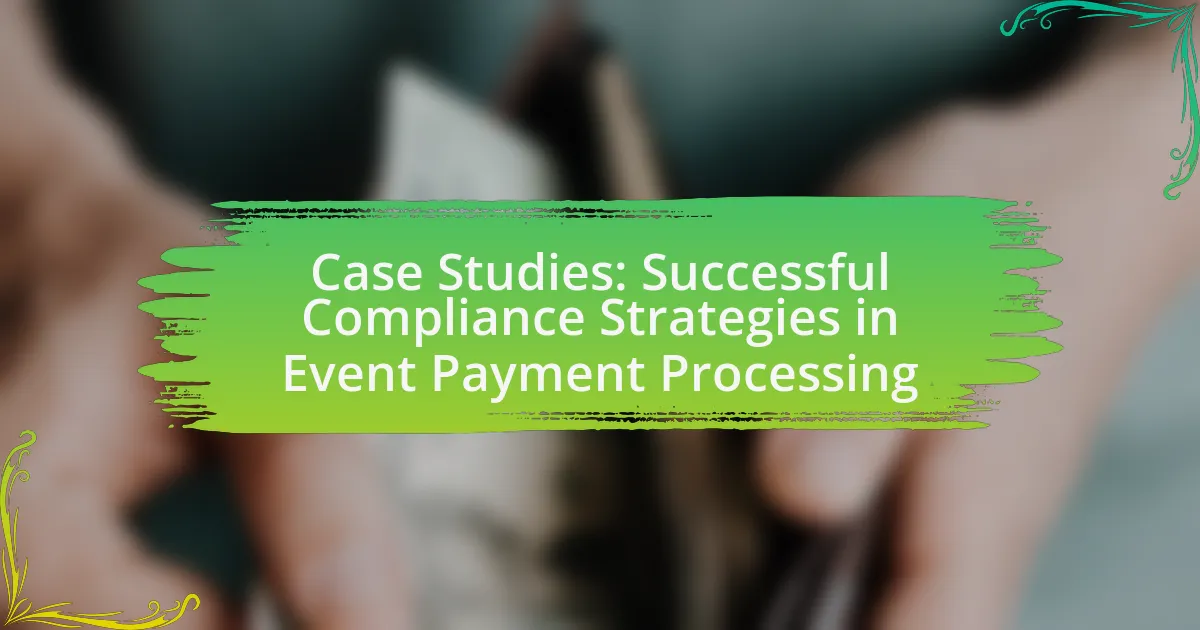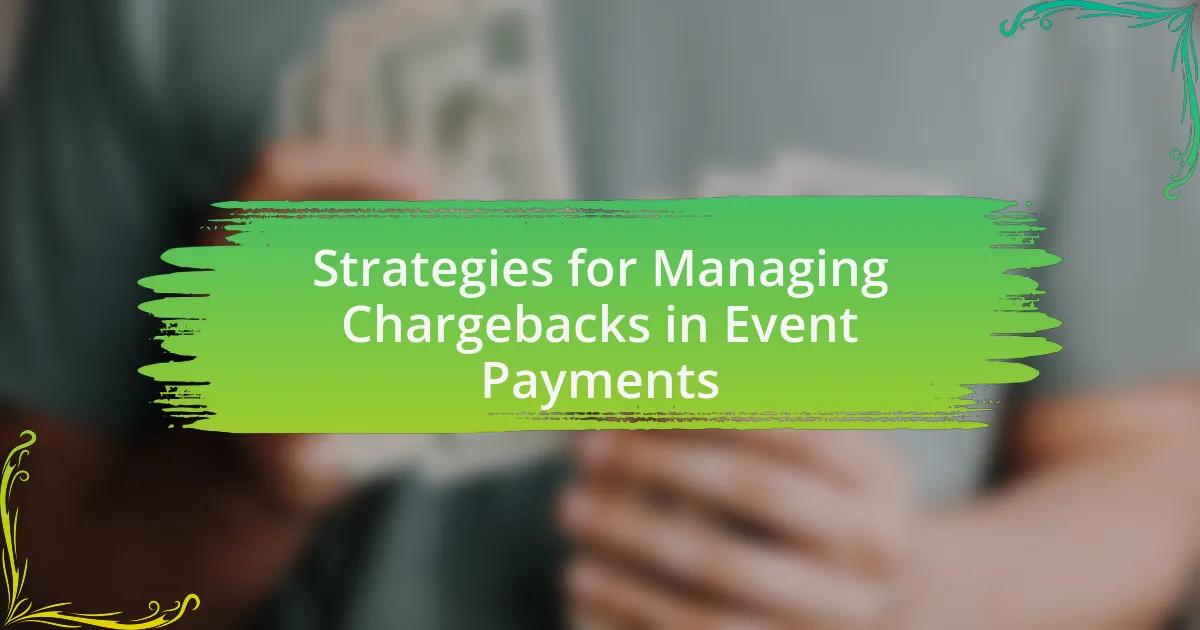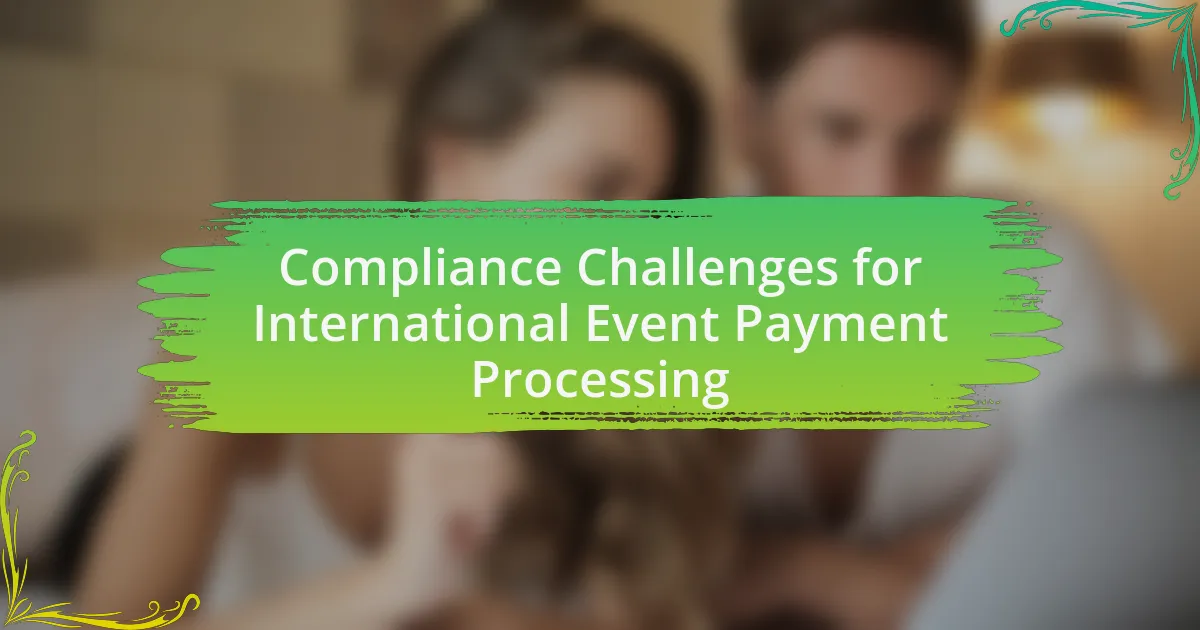The article focuses on best practices for secure payment processing at events, emphasizing the importance of using encrypted payment gateways, ensuring PCI compliance, and training staff on security protocols. It outlines essential technologies such as encryption, tokenization, and multi-factor authentication that enhance payment security. The article also discusses the significance of compliance with payment security standards, the role of staff training in mitigating risks, and the common fraud types event organizers should be aware of. Additionally, it highlights practical tips for implementing secure payment solutions and the benefits of mobile payment systems in improving customer experience and security.
What are Best Practices for Secure Payment Processing at Events?

Best practices for secure payment processing at events include using encrypted payment gateways, ensuring PCI compliance, and training staff on security protocols. Encrypted payment gateways protect sensitive information during transactions, while PCI compliance ensures that all payment processing meets industry security standards. Additionally, training staff on recognizing phishing attempts and secure handling of payment data minimizes the risk of fraud. Implementing these practices significantly reduces vulnerabilities and enhances the overall security of payment processing at events.
How can event organizers ensure secure payment processing?
Event organizers can ensure secure payment processing by implementing PCI DSS compliance, utilizing secure payment gateways, and employing encryption technologies. PCI DSS, or Payment Card Industry Data Security Standard, provides a framework for protecting cardholder data, which is essential for maintaining security during transactions. Secure payment gateways, such as PayPal or Stripe, offer built-in fraud detection and secure transaction processing, reducing the risk of data breaches. Additionally, encryption technologies safeguard sensitive information by converting it into a secure format that is unreadable to unauthorized users, further enhancing the security of payment transactions.
What technologies are essential for secure payment processing?
Essential technologies for secure payment processing include encryption, tokenization, secure payment gateways, and multi-factor authentication. Encryption protects sensitive data by converting it into a secure format that can only be read by authorized parties. Tokenization replaces sensitive card information with a unique identifier or token, minimizing the risk of data breaches. Secure payment gateways facilitate the transfer of payment information between customers and merchants while ensuring compliance with security standards like PCI DSS. Multi-factor authentication adds an extra layer of security by requiring users to provide two or more verification factors to gain access to their accounts. These technologies collectively enhance the security of payment transactions and protect against fraud.
How do encryption and tokenization enhance payment security?
Encryption and tokenization enhance payment security by protecting sensitive data during transactions. Encryption transforms payment information into an unreadable format, ensuring that even if data is intercepted, it cannot be deciphered without the appropriate key. Tokenization replaces sensitive data with unique identifiers or tokens, which have no exploitable value, thus minimizing the risk of data breaches. According to a study by the Ponemon Institute, organizations that implement encryption and tokenization can reduce the cost of data breaches by up to 50%, demonstrating their effectiveness in safeguarding payment information.
Why is it important to comply with payment security standards?
Complying with payment security standards is crucial to protect sensitive financial information and prevent fraud. Adherence to these standards, such as the Payment Card Industry Data Security Standard (PCI DSS), significantly reduces the risk of data breaches, which can lead to financial losses and damage to reputation. For instance, a study by Verizon found that 81% of data breaches are linked to weak or stolen passwords, highlighting the importance of robust security measures. By following established payment security protocols, organizations not only safeguard customer data but also enhance trust and credibility with their clients.
What are the key payment security standards to follow?
The key payment security standards to follow include the Payment Card Industry Data Security Standard (PCI DSS), which outlines security measures for organizations that handle credit card information. Compliance with PCI DSS is essential as it helps protect cardholder data and reduces the risk of data breaches. Additionally, adhering to the EMV (Europay, MasterCard, and Visa) standard for chip card transactions enhances security by making it more difficult for fraudsters to clone cards. Implementing Secure Sockets Layer (SSL) encryption for online transactions is also critical, as it ensures that sensitive information is transmitted securely over the internet. These standards collectively contribute to a robust framework for secure payment processing.
How does compliance impact customer trust and event success?
Compliance significantly enhances customer trust and contributes to event success by ensuring that organizations adhere to legal and regulatory standards. When event organizers implement compliance measures, such as data protection regulations and secure payment processing protocols, they demonstrate a commitment to safeguarding customer information. This commitment fosters trust, as customers feel more secure knowing their personal and financial data is protected.
Research indicates that 70% of consumers are more likely to engage with businesses that prioritize compliance and data security (Source: Ponemon Institute, 2021). Furthermore, events that prioritize compliance often experience higher attendance rates and customer satisfaction, as attendees are reassured by the organization’s dedication to ethical practices and risk management.
What role does staff training play in secure payment processing?
Staff training plays a critical role in secure payment processing by equipping employees with the knowledge and skills necessary to identify and mitigate security risks. Trained staff are more likely to recognize fraudulent activities, understand compliance requirements, and implement best practices for data protection. For instance, a study by the Ponemon Institute found that organizations with comprehensive security training programs experienced 50% fewer data breaches compared to those without such training. This highlights the importance of ongoing education in maintaining secure payment systems and protecting sensitive customer information.
What topics should be covered in staff training sessions?
Staff training sessions should cover topics such as secure payment processing, data protection regulations, fraud detection techniques, and customer service protocols. These topics are essential to ensure that staff members are equipped with the knowledge and skills necessary to handle payment transactions securely and efficiently. For instance, understanding data protection regulations like GDPR helps staff comply with legal requirements, while training in fraud detection techniques enables them to identify and mitigate potential risks during payment processing.
How can ongoing training improve security awareness?
Ongoing training can significantly improve security awareness by continuously updating employees on the latest threats and best practices. Regular training sessions reinforce knowledge, ensuring that staff remain vigilant against evolving security risks, such as phishing attacks and data breaches. Research indicates that organizations with ongoing security training programs experience a 70% reduction in security incidents, highlighting the effectiveness of consistent education in fostering a security-conscious culture.
What are the common risks associated with payment processing at events?

Common risks associated with payment processing at events include data breaches, fraud, and system failures. Data breaches can occur when sensitive customer information, such as credit card details, is compromised due to inadequate security measures. According to a 2020 report by Verizon, 28% of data breaches involved payment card information, highlighting the vulnerability of payment systems. Fraud can manifest in various forms, including chargebacks and identity theft, which can lead to significant financial losses for event organizers. Additionally, system failures, such as network outages or software malfunctions, can disrupt payment processing, resulting in lost sales and customer dissatisfaction. These risks necessitate robust security protocols and contingency plans to safeguard financial transactions at events.
What types of fraud should event organizers be aware of?
Event organizers should be aware of several types of fraud, including ticket fraud, chargeback fraud, and vendor fraud. Ticket fraud involves the sale of counterfeit or invalid tickets, which can lead to financial losses and customer dissatisfaction. Chargeback fraud occurs when a customer disputes a legitimate transaction, resulting in a reversal of funds, often exploiting the payment system. Vendor fraud involves dishonest suppliers or service providers who may overcharge or fail to deliver services as promised. According to a report by the Event Safety Alliance, 30% of event organizers have experienced some form of fraud, highlighting the importance of vigilance in payment processing and vendor selection.
How can chargebacks affect event finances?
Chargebacks can significantly impact event finances by reducing overall revenue and increasing operational costs. When attendees dispute charges, the event organizer not only loses the revenue from the ticket sales but may also incur additional fees from payment processors, which can range from $15 to $100 per chargeback. Furthermore, a high chargeback rate can lead to penalties from payment processors, including higher transaction fees or even the termination of merchant accounts. This financial strain can hinder the ability to invest in future events, affecting overall profitability and sustainability.
What are the signs of potential payment fraud during events?
Signs of potential payment fraud during events include unusual transaction patterns, such as multiple transactions from the same card in a short time frame, and transactions that exceed typical spending limits for the event. Additionally, the use of mismatched billing addresses or names that do not correspond with the cardholder’s information can indicate fraudulent activity. According to a report by the Federal Trade Commission, 25% of fraud cases involve unauthorized transactions that deviate from expected behavior, highlighting the importance of monitoring for these signs during events.
How can event organizers mitigate payment processing risks?
Event organizers can mitigate payment processing risks by implementing secure payment gateways and ensuring compliance with PCI DSS standards. Secure payment gateways encrypt sensitive data during transactions, reducing the likelihood of fraud and data breaches. Compliance with PCI DSS, which includes requirements for secure handling of cardholder information, further protects against unauthorized access and enhances consumer trust. According to the PCI Security Standards Council, organizations that adhere to these standards significantly lower their risk of data breaches, making it a critical practice for event organizers.
What measures can be taken to prevent data breaches?
To prevent data breaches, organizations should implement strong encryption protocols for sensitive data. Encryption protects data by converting it into a secure format that can only be read by authorized users, significantly reducing the risk of unauthorized access. According to a report by the Ponemon Institute, organizations that use encryption experience 50% fewer data breaches compared to those that do not. Additionally, regular security audits and vulnerability assessments help identify and mitigate potential weaknesses in systems, further enhancing data protection. Implementing multi-factor authentication adds an extra layer of security, making it more difficult for unauthorized individuals to gain access to sensitive information.
How can real-time monitoring help in risk management?
Real-time monitoring enhances risk management by providing immediate visibility into transactions and potential threats. This capability allows organizations to detect anomalies, such as fraudulent activities or system failures, as they occur, enabling swift responses to mitigate risks. For instance, a study by the International Journal of Information Management highlights that real-time data analysis can reduce fraud detection time by up to 70%, significantly lowering financial losses. By continuously tracking payment processes, organizations can ensure compliance with security protocols and quickly address vulnerabilities, thereby strengthening overall risk management strategies.
What are the best practices for implementing secure payment solutions at events?

The best practices for implementing secure payment solutions at events include using encrypted payment gateways, ensuring PCI compliance, and training staff on security protocols. Encrypted payment gateways protect sensitive data during transactions, while PCI compliance ensures that all payment processing meets industry security standards, reducing the risk of data breaches. Additionally, training staff on security protocols helps to mitigate human error, which is a common vulnerability in payment processing. According to the Payment Card Industry Security Standards Council, organizations that adhere to PCI standards can significantly lower their chances of experiencing a data breach.
How should event organizers choose a payment processor?
Event organizers should choose a payment processor based on transaction fees, security features, and integration capabilities. Transaction fees can significantly impact overall revenue; therefore, comparing rates from multiple processors is essential. Security features, such as PCI compliance and fraud detection, protect both the organizer and attendees from potential breaches. Additionally, integration capabilities with existing event management software streamline operations and enhance user experience. According to a 2021 survey by Eventbrite, 70% of event organizers prioritize payment security, highlighting its importance in the selection process.
What features should be prioritized when selecting a payment processor?
When selecting a payment processor, prioritize security features, transaction fees, integration capabilities, and customer support. Security features, such as PCI compliance and encryption, protect sensitive data and reduce fraud risk, which is crucial for maintaining customer trust. Transaction fees impact overall costs; therefore, understanding the fee structure helps in budgeting effectively. Integration capabilities with existing systems streamline operations and enhance user experience, while reliable customer support ensures quick resolution of issues, which is vital during events. These features collectively contribute to a secure and efficient payment processing experience.
How can integration with existing systems enhance security?
Integration with existing systems enhances security by enabling seamless data sharing and real-time monitoring across platforms. This interconnectedness allows for the identification of potential threats and vulnerabilities more effectively, as systems can communicate and respond to security incidents promptly. For instance, integrating payment processing systems with fraud detection tools can significantly reduce the risk of unauthorized transactions, as these tools analyze transaction patterns in real-time to flag suspicious activities. Studies have shown that organizations employing integrated security solutions experience up to 50% fewer security breaches compared to those using isolated systems, demonstrating the effectiveness of such integration in enhancing overall security.
What are the benefits of using mobile payment solutions at events?
Mobile payment solutions at events enhance convenience and speed for transactions. They allow attendees to make purchases quickly using their smartphones, reducing wait times at booths and enhancing the overall event experience. According to a study by Statista, mobile payment usage is projected to reach $12 trillion globally by 2025, indicating a significant shift towards digital transactions. Additionally, mobile payments can improve security by minimizing cash handling, which reduces the risk of theft and fraud. A report from the Federal Reserve shows that electronic payments are less susceptible to fraud compared to cash transactions, further validating the benefits of mobile payment solutions at events.
How do mobile payments improve customer experience and security?
Mobile payments enhance customer experience and security by providing convenience and advanced encryption technologies. Customers benefit from the ability to make quick transactions using their smartphones, reducing wait times and streamlining the purchasing process. This immediacy improves satisfaction and encourages repeat business. Additionally, mobile payment systems often utilize encryption and tokenization, which protect sensitive information during transactions. According to a report by the Federal Reserve, 75% of consumers feel more secure using mobile payments due to these security features, demonstrating a significant increase in trust and safety in financial transactions.
What precautions should be taken when using mobile payment systems?
When using mobile payment systems, users should ensure their devices are secure by enabling features such as biometric authentication and keeping software updated. This is crucial because outdated software can have vulnerabilities that cybercriminals exploit. Additionally, users should only download payment apps from official app stores to avoid malicious software. Research indicates that 60% of mobile malware is found in unofficial app stores, highlighting the importance of this precaution. Users should also monitor their accounts regularly for unauthorized transactions, as prompt detection can mitigate potential losses.
What practical tips can enhance secure payment processing at events?
Implementing encryption for all payment transactions significantly enhances secure payment processing at events. Encryption protects sensitive data by converting it into a secure format that can only be read by authorized parties. Additionally, using reputable payment processors that comply with Payment Card Industry Data Security Standards (PCI DSS) ensures that transactions are handled securely, as these standards are designed to protect card information during and after a financial transaction. Regularly updating software and payment systems also mitigates vulnerabilities, as outdated systems are more susceptible to breaches. Furthermore, training staff on security protocols and recognizing phishing attempts can prevent unauthorized access to payment systems. These practices collectively contribute to a more secure payment environment at events.






